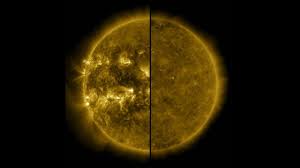The solar cycle, characterized by periodic variations in solar activity, plays a significant role in shaping space weather phenomena, including solar storms, solar flares, and coronal mass ejections (CMEs). In recent times, the sun has been particularly active, emitting bursts of energy and particles into space, resulting in awe-inspiring displays of auroras on Earth and impacting neighboring planets such as Mars.
Understanding Solar Activity
The sun, our nearest star, undergoes a cycle of approximately 11 years, during which it transitions from a period of low to high activity and back again. This cycle is driven by changes in the sun’s magnetic field and is accompanied by an increase in solar phenomena such as sunspots, solar flares, and CMEs.
Solar Storms and Auroras
Solar storms, caused by eruptions on the sun’s surface, can produce stunning auroras when energetic particles from the sun interact with Earth’s magnetic field and atmosphere. These colorful displays of light are often visible near the polar regions and are a testament to the dynamic nature of our sun.
Recent Solar Events
In May 20XX, a powerful solar flare, the strongest in recent memory, erupted from the sun and made its way towards the Red Planet, Mars. This event was followed by another significant solar explosion, known as a coronal mass ejection, which also reached Mars shortly after.
NASA’s Curiosity Rover Observations
NASA’s Curiosity Rover, stationed on the Martian surface, captured the effects of these energetic particles from the sun as they interacted with the Martian atmosphere. These observations provide valuable insights into the impact of solar activity on planetary environments beyond Earth.
The recent surge in solar activity has provided astronomers and space agencies with a unique opportunity to study the dynamics of our sun and its effects on the solar system. As we continue to monitor these phenomena, we gain a deeper understanding of the sun-Earth connection and the broader implications for space weather forecasting and planetary exploration.




